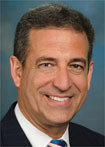Ilankai Tamil Sangam30th Year on the Web Association of Tamils of Sri Lanka in the USA |
|||
 Home Home Archives Archives |
Statement of U.S. Senator Russ Feingold on Sri Lankaby Sen. Feingold, Congressional Record, June 3, 2009
This tragic war has claimed the lives of over 70,000 Sri Lankans, displaced hundreds of thousands, and seen systematic and brutal atrocities committed by both sides. Over the last five months, as the conflict intensified, it drew increasing and unprecedented attention from the international community. Nevertheless, obtaining a clear picture of this conflict, especially the situation of the estimated 290,000 people living in internally displaced persons camps, has been obscured by the Sri Lankan government’s severe restrictions on access for media, international observers, and humanitarian aid workers. Mr. President, if we are to see a sustainable solution to this conflict over the long term, it is vital that the Sri Lankan government remove these restrictions now and allow access to all independent actors. I was pleased that President Rajapaksa acknowledged that Sri Lanka must not accept a military solution as the ultimate solution. As we have seen in conflicts around the world, a military ceasefire will not hold if the underlying causes that led to this conflict are not addressed. The fundamental grievances of the Tamil minority have been overshadowed, distorted, and in some cases silenced by the severe tactics of the LTTE, who since 1997 have been designated by the US as a terrorist organization. The LTTE claimed to be the voice of the Tamil people and yet their commitment to both indiscriminate and targeted violence, as well as reports from the last days of fighting that they used Tamil civilians as human shields, would indicate otherwise. If we are to see legitimate reconciliation in Sri Lanka, the grievances of the Tamil minority must be seen as distinct from the violence of the LTTE and addressed thoroughly and justly. I urge President Rajapaksa to take steps now to demonstrate a serious commitment to a political solution, the rule of law, and most importantly, to genuinely addressing the needs of the Tamil people. At the same time, in proportion to the passion and effort with which the world’s diplomats have demanded peace and respect for civilians throughout this conflict, donor countries must remain actively engaged and dedicated to helping bring about a lasting resolution to this decades old conflict. Mr. President, I am especially concerned about issues surrounding resettlement. In the wake of this conflict, land mines line those roads which still exist and cover farmers’ fields in northern Sri Lanka. Schools, hospitals, roads, homes, and businesses have been damaged, and in some cases completely destroyed. Some 290,000 internally displaced people languish in squalid humanitarian camps – the safe and voluntary return of whom must be a top priority for post-conflict recovery. The Sri Lankan government must not shirk its responsibility to help these people return to their homes swiftly and safely. The international community, too, can provide assistance to help these people return home safely or seek other lasting solutions. The U.S. government should join with its international partners to coordinate demining efforts, work with the Sri Lankan government to develop and rebuild infrastructure, and ensure that those who have been displaced are able to reclaim the land that is rightfully theirs. Mr. President, these events are critical steps in the right direction in a long and complicated history. If we seek to address this conflict comprehensively, we must learn from past setbacks and help identify new opportunities for the people of Sri Lanka. It will not be easy, but on behalf of all the innocent civilians whose lives have been caught in the crossfire of this conflict, we must support this opportunity to finally achieve lasting and long awaited peace in Sri Lanka. I yield the floor. |
||
|
|||
 Mr. President, last month Sri Lanka saw an end to the long-standing military conflict between the Liberation Tigers of Tamil Eelam, the LTTE, and the Sri Lankan government. In the immediate days that followed the end of fighting, President Mahinda Rajapaksa delivered a speech to his nation’s parliament which formally marked the conclusion of an armed conflict that has escalated since January, but stretches back over twenty-six years.
Mr. President, last month Sri Lanka saw an end to the long-standing military conflict between the Liberation Tigers of Tamil Eelam, the LTTE, and the Sri Lankan government. In the immediate days that followed the end of fighting, President Mahinda Rajapaksa delivered a speech to his nation’s parliament which formally marked the conclusion of an armed conflict that has escalated since January, but stretches back over twenty-six years.